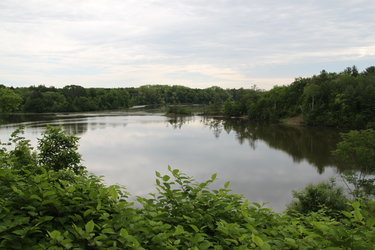Town of Guilderland settles on Watervliet reservoir assessment
GUILDERLAND — The town, after scheduling a trial, has settled with the city of Watervliet for its assessment of Watervliet’s reservoir.
Watervliet built its reservoir a century ago in then-rural Guilderland, by damming the Normanskill, as typhoid plagued the city.
Before the trial, on March 30, Watervliet had made a settlement offer in which the 2019 assessment of the main reservoir parcel would be reduced to $6 million, the 2020 assessment would be reduced to $5 million, and the 2021 assessment would be reduced to $4 million.
Guilderland ultimately accepted that proposal. The town board had discussed accepting that settlement in executive session, as state law allows.
The Guilderland school district has signed off on the settlement, Supervisor Peter Barber told the other town board members at their meeting on Tuesday, April 19. “The order has already been signed and the judge has OK’d it,” said Barber.
As no vote was taken during the executive session, Barber said, the board voted unanimously on Tuesday to approve the settlement.
An April 18 memo from Daniel G. Vincelette, of The Vincelette Law Firm in Latham, which represented the town, to Barber as well as the town’s attorney and assessor, said, “The Guilderland Central School District passed a resolution accepting the settlement the night before the trial.” The school district’s tax loss from the settlement is far greater than the town’s.
Guilderland’s assessment of the reservoir had increased dramatically with the townwide revaluation in 2019. Prior to revaluation, the reservoir was assessed at $2.7 million, according to Vincelette.
The post-revaluation assessment placed these values on each of three reservoir properties: $17,530,000 for 688 acres of the reservoir and the majority of the dam, powerhouse, and improvements as well as $42,729 and $120,358 for two parcels (one in the Guilderland school district and the other in the Mohonasen district) that contain the water transmission line passing through the town from the reservoir.
Vincelette recommended the town accept the settlement as “a cost-effective resolution.”
He wrote, “It is highly probable that the Court will rule in favor of the City, and analysis performed by the Assessor and this office indicates that the assessment cannot be sustained at trial.”
The settlement, he wrote, would have “minimal financial impact” on the town since the difference in refund from the town between a judgment adopting Watervliet’s values and the settlement is about $3,400.
“It is better to resolve this matter now without interest than to wait more than a year for a result that would probably value the 2019 and 2020 assessments of the property lower than the settlement amounts,” Vincelette concluded.
Judge Margaret T. Walsh of the Albany County Supreme Court, signed off on the settlement on April 8. Her order says that, in addition to the town of Guilderland, Albany County, fire districts, the school district, and the library will make refunds.
New sidewalk
The town board also agreed to fund a new sidewalk on the south side of Western Avenue from Devonshire Drive to Mercy Care Lane, near the library.
Since the town board first approved the project, Barber said, “The construction costs have gone up.”
Although 80 percent of the costs are to be covered by federal funds, the town has to initially foot the entire bill for just over $1.3 million.
Ultimately, the town’s share will total $152,600, which Barber said will be largely from in-kind services performed by the highway department, such as the work already underway removing trees.
New sweeper
The town is buying a road sweeper to meet new state regulations.
The board agreed to spend $250,000 from the general fund to purchase the sweeper and about $30,000 from the highway reserve fund for additional options.
Highway Superintendent Gregory Weir wrote to Barber and the board that, if American Rescue Plan funds could cover the $250,000, highway reserve funds could cover the rest. Currently, the town has one sweeper, Weir said, but it is used to clean catch basins and to vacuum millings when road patching.
The state’s Department of Environmental Conservation has new regulations, said Barber, requiring the town to sweep its streets twice a year to keep “stones, brush, and all that stuff out of stormwater so stormwater doesn’t get backed up and cause flooding.”
The board also moved $125,000 in state funds “to the line where we can actually spend the money,” said Barber, which will be used to purchase trail equipment.
The board’s third and final budget modification was to transfer about $3,200 to pay for emergency temporary heaters after a boiler at the town hall failed. “When our heating system went down, we had to get kerosene heaters,” said Barber.
Ball fields upgraded
The town board approved a short assessment form under the State Environmental Quality Review Act for improvements at Nott Road Park and Tawasentha Park to be funded with a state grant, secured through Senator Michelle Hinchey.
“No” was checked for each of 11 questions on the impact assessment form, meaning the use of the land won’t change and there will be no harm to the environment or to human health.
The 150,000 grant will be used to install backstops at four ball fields at the Nott Road Park while three infields will be resurfaced, Barber said. At Tawasentha Park, he said, the backstop at the Babe Ruth field will be replaced.
“Four-legged word”
Emma Harbeck, a junior at Guilderland High School, introduced herself to the board as the Miss Capital Region Outstanding Teen. She will compete in the Miss New York Pageant, part of the Miss America competition.
“All Misses have to have a social-impact initiative,” Harbeck said. Hers is called “Love is a four-legged word” as she promotes awareness on the importance of service animals.
Harbeck and her family, as part of Canine Companions, are raising a puppy to be used as a service dog.


